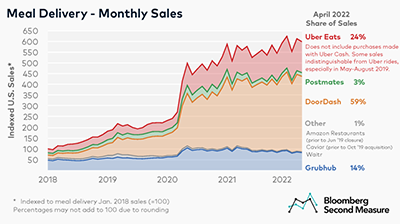For the past several years, the U.S. economy has been shifting to what is referred to as an on-demand economy. With the rise of companies such as Amazon and Instacart, who offer consumers products that arrive on their doorstep in less than 24 hours, the economy has shifted to a model that encourages instant gratification from purchasing. Many consumers make their spending decisions based on how soon they can receive something without having to do anything additional outside of their daily routine. An on-demand economy changes the way not only consumers make decisions, but impacts the decisions that businesses need to make to continue to be relevant and competitive both today and in the future.
COVID Drastically Changed Consumer Behavior
 The on-demand economy model was projected to continue to increase each year, but the 2020 pandemic caused its progression to skyrocket. As consumers were confined to their homes with little to no interaction with others, people and the economy relied almost completely on these instant services. Curbside and delivery services were necessary to access basic provisions and to support some of our favorite restaurants and businesses. Breathing new life into the food industry, food delivery services promoted a consumer behavior shift and ushered in a new pandemic effect on the economy.
The on-demand economy model was projected to continue to increase each year, but the 2020 pandemic caused its progression to skyrocket. As consumers were confined to their homes with little to no interaction with others, people and the economy relied almost completely on these instant services. Curbside and delivery services were necessary to access basic provisions and to support some of our favorite restaurants and businesses. Breathing new life into the food industry, food delivery services promoted a consumer behavior shift and ushered in a new pandemic effect on the economy.
 Life as we used to know it changed—and the economy along with it. As efforts to move past the pandemic continue, consumers have maintained the on-demand gig economy model. Instant gratification has become normalized, and this is reflected in the economy beyond the increasing popularity of food delivery services. Healthcare and doctor appointments can now mostly be done through telehealth. Students are looking to online higher education to complete their degrees or certificates. And many find that furthering their studies in business positions them as valuable resources to companies in need of adapting to this delivery-focus economy. Employees are pushing to maintain work-from-home or hybrid options, as evidenced in part by the “great resignation.” Consumers have adapted their lifestyles around an on-demand gig economy, and businesses must also adapt to succeed.
Life as we used to know it changed—and the economy along with it. As efforts to move past the pandemic continue, consumers have maintained the on-demand gig economy model. Instant gratification has become normalized, and this is reflected in the economy beyond the increasing popularity of food delivery services. Healthcare and doctor appointments can now mostly be done through telehealth. Students are looking to online higher education to complete their degrees or certificates. And many find that furthering their studies in business positions them as valuable resources to companies in need of adapting to this delivery-focus economy. Employees are pushing to maintain work-from-home or hybrid options, as evidenced in part by the “great resignation.” Consumers have adapted their lifestyles around an on-demand gig economy, and businesses must also adapt to succeed.
Our On-Demand Economy is Here to Stay
For business to remain competitive in the future, they must remain flexible. If they are selling a product, offering delivery services and easy returns can increase their revenue as they cater to the demand of consumers. Today, not only are food options available for delivery, but many of these businesses now offer delivery from convenience stores, retail stores, and liquor stores. This expansion of services speaks to changing consumer habits. People expect to have the option to order what they want and have it delivered using little more than a mobile app. Given the prevalence of this consumer buying behavior, restaurants and retailers have begun to offer their own delivery services rather than relying on third parties in order to increase their internal revenue.
 The future of an on-demand economy will continue to depend on consumer preferences, which at this point shows no sign of returning to a pre-pandemic state.
The future of an on-demand economy will continue to depend on consumer preferences, which at this point shows no sign of returning to a pre-pandemic state.
An on-demand economy is important for everyone to understand, as it will influence our decisions, values, and culture moving forward. Flexibility has become the key to both producer and consumer behavior, and is a crucial element to allow businesses to continue to grow and boost the economy. The gig economy continues to move forward, and catering to the cost of convenience seems to be a winning recipe.
If you are considering an online learning format to continue your education or pursue a degree, UMGC offers many opportunities to achieve your goals.
Source: https://secondmeasure.com/datapoints/food-delivery-services-grubhub-uber-eats-doordash-postmates/
Reference on this webpage to any third-party entity or product does not constitute or imply endorsement by UMGC nor does it constitute or imply endorsement of UMGC by the third party.

/blog-umgc-masters-strategic-communications-banner-linklist-shutterstock_2115451625.jpg)
/blog-umgc-online-business-degree-banner-linklist-shutterstock_2345695197.jpg)
/blog-umgc-bs-legal-studies-banner-linklist-gettyimages-1487278330.jpg)

Share This